- Home
- Jennifer Donnelly
Revolution
Revolution Read online
ALSO BY JENNIFER DONNELLY
A Northern Light
This is a work of fiction. All incidents and dialogue, and all characters with the exception of some well-known historical and public figures, are products of the author’s imagination and are not to be construed as real. Where real-life historical or public figures appear, the situations, incidents, and dialogues concerning those persons are fictional and are not intended to depict actual events or to change the fictional nature of the work. In all other respects, any resemblance to persons living or dead is entirely coincidental.
Copyright © 2010 by Jennifer Donnelly
All rights reserved. Published in the United States by Delacorte Press, an imprint of Random House Children’s Books, a division of Random House, Inc., New York.
Delacorte Press is a registered trademark and the colophon is a trademark of Random House, Inc.
Owing to limitations of space, all acknowledgments to reprint previously published material can be found on this page.
Visit us on the Web! www.randomhouse.com/teens
Educators and librarians, for a variety of teaching tools, visit us at
www.randomhouse.com/teachers
Library of Congress Cataloging-in-Publication Data Donnelly, Jennifer.
Revolution / Jennifer Donnelly. — 1st ed.
p. cm.
Summary: An angry, grieving seventeen-year-old musician facing expulsion from her prestigious Brooklyn private school travels to Paris to complete a school assignment and uncovers a diary written during the French revolution by a young actress attempting to help a tortured, imprisoned little boy—Louis Charles, the lost king of France.
eISBN: 978-0-375-89760-3 — [1. Grief—Fiction. 2. Emotional problems—Fiction. 3. Family problems—Fiction. 4. Musicians—Fiction. 5. Diaries—Fiction. 6. Paris (France)—Fiction. 7. France—Fiction. 8. France—History—Revolution, 1789–1799—Fiction. 9. Louis XVII, of France, 1785–1795—Fiction.] I. Title.
PZ7.D7194Re 2010
[Fic]—dc22
2010008993
Random House Children’s Books supports the First Amendment and celebrates the right to read.
v3.1
For Daisy,
who kicked out the walls of my heart
Contents
Cover
Other Books by this Author
Title Page
Copyright
Dedication
Part 1 - Hell
Chapter 1
Chapter 2
Chapter 3
Chapter 4
Chapter 5
Chapter 6
Chapter 7
Chapter 8
Chapter 9
Chapter 10
Chapter 11
Chapter 12
Chapter 13
Chapter 14
Chapter 15
Chapter 16
Chapter 17
Chapter 18
Chapter 19
Chapter 20
Chapter 21
Chapter 22
Chapter 23
Chapter 24
Chapter 25
Chapter 26
Chapter 27
Chapter 28
Chapter 29
Chapter 30
Chapter 31
Chapter 32
Chapter 33
Chapter 34
Chapter 35
Chapter 36
Chapter 37
Chapter 38
Chapter 39
Chapter 40
Chapter 41
Chapter 42
Chapter 43
Chapter 44
Chapter 45
Chapter 46
Chapter 47
Chapter 48
Chapter 49
Chapter 50
Chapter 51
Chapter 52
Chapter 53
Chapter 54
Chapter 55
Chapter 56
Chapter 57
Chapter 58
Chapter 59
Chapter 60
Chapter 61
Chapter 62
Part 2 - Purgatory
Chapter 63
Chapter 64
Chapter 65
Chapter 66
Chapter 67
Chapter 68
Chapter 69
Chapter 70
Chapter 71
Chapter 72
Chapter 73
Chapter 74
Chapter 75
Chapter 76
Chapter 77
Chapter 78
Chapter 79
Chapter 80
Chapter 81
Chapter 82
Chapter 83
Chapter 84
Chapter 85
Part 3 - PARADISE
Chapter 86
Chapter 87
Epilogue
Acknowledgments
Permissions
A Note on Sources
Bibliography
About the Author
I found myself within a forest dark,
For the straightforward pathway had been lost. Ah me! How hard a thing it is to say,
What was this forest savage, rough, and stern,
Which in the very thought renews the fear. So bitter is it, death is little more….
—DANTE The Divine Comedy
HELL
And to a place I come where nothing shines.
—DANTE
1
Those who can, do.
Those who can’t, deejay.
Like Cooper van Epp. Standing in his room—the entire fifth floor of a Hicks Street brownstone—trying to beat-match John Lee Hooker with some piece of trip-hop horror. On twenty thousand dollars’ worth of equipment he doesn’t know how to use.
“This is the blues, man!” he crows. “It’s Memphis mod.” He pauses to pour himself his second scotch of the morning. “It’s like then and now. Brooklyn and Beale Street all at once. It’s like hanging at a house party with John Lee. Smoking Kents and drinking bourbon for breakfast. All that’s missing, all we need—”
“—are hunger, disease, and a total lack of economic opportunity,” I say.
Cooper pushes his porkpie back on his head and brays laughter. He’s wearing a wifebeater and an old suit vest. He’s seventeen, white as cream and twice as rich, trying to look like a bluesman from the Mississippi Delta. He doesn’t. He looks like Norton from The Honeymooners.
“Poverty, Coop,” I add. “That’s what you need. That’s where the blues come from. But that’s going to be hard for you. I mean, son of a hedge fund god and all.”
His idiot grin fades. “Man, Andi, why you always harshing me? Why you always so—”
Simone Canovas, a diplomat’s daughter, cuts him off. “Oh, don’t bother, Cooper. You know why.”
“We all do. It’s getting boring,” says Arden Tode, a movie star’s kid.
“And one last thing,” I say, ignoring them, “talent. You need talent. Because John Lee Hooker had boatloads of it. Do you actually write any music, Coop? Do you play any? Or do you just stick other people’s stuff together and call the resulting calamity your own?”
Cooper’s eyes harden. His mouth twitches. “You’re battery acid. You know that?”
“I do.”
I am. No doubt about it. I like humiliating Cooper. I like causing him pain. It feels good. It feels better than his dad’s whiskey, better than his mom’s weed. Because for just a few seconds, someone else hurts, too. For just a few seconds, I’m not alone.
I pick up my guitar and play the first notes of Hooker’s “Boom Boom.” Badly, but it does the trick. Cooper swears at me and storms off.
Simone glares. “That was brutal, Andi. He’s a fragile soul,” she says; then she
takes off after him. Arden takes off after her.
Simone doesn’t give a rat’s about Cooper or his soul. She’s only worried he’ll pull the plug on our Friday-morning breakfast party. She never faces school without a buzz. Nobody does. We need to have something, some kind of substance-fueled force field to fend off the heavy hand of expectation that threatens to crush us like beer cans the minute we set foot in the place.
I quit playing “Boom Boom” and ease into “Tupelo.” No one pays any attention. Not Cooper’s parents, who are in Cabo for the holidays. Not the maid, who’s running around opening windows to let the smoke out. And not my classmates, who are busy trading iPods back and forth, listening to one song after another. No Billboard Hot 100 fare for us. We’re better than that. Those tunes are for kids at P.S. Whatever-the-hell. We attend St. Anselm’s, Brooklyn’s most prestigious private school. We’re special. Exceptional. We’re supernovas, every single one of us. That’s what our teachers say, and what our parents pay thirty thousand dollars a year to hear.
This year, senior year, it’s all about the blues. And William Burroughs, Balkan soul, German countertenors, Japanese girl bands, and New Wave. It’s calculated, the mix. Like everything else we do. The more obscure our tastes, the greater the proof of our genius.
As I sit here mangling “Tupelo,” I catch broken-off bits of conversation going on around me.
“But really, you can’t even approach Flock of Seagulls without getting caught up in the metafictive paradigm,” somebody says.
And “Plastic Bertrand can, I think, best be understood as a postironic nihilist referentialist.”
And “But, like, New Wave derived meaning from its own meaninglessness. Dude, the tautology was so intended.”
And then, “Wasn’t that a mighty time, wasn’t that a mighty time …”
I look up. The kid singing lines from “Tupelo,” a notorious horndog from Slater, another Heights school, is suddenly sitting on the far end of the sofa I’m sitting on. He smirks his way over until our knees are touching.
“You’re good,” he says.
“Thanks.”
“You in a band?”
I keep playing, head down, so he takes a bolder tack.
“What’s this?” he says, leaning over to tug on the red ribbon I wear around my neck. At the end of it is a silver key. “Key to your heart?”
I want to kill him for touching it. I want to say words that will slice him to bits, but I have none. They dry up in my throat. I can’t speak, so I hold up my hand, the one covered in skull rings, and clench it into a fist.
He drops the key. “Hey, sorry.”
“Don’t do that,” I tell him, tucking it back inside my shirt. “Ever.”
“Okay, okay. Take it easy, psycho,” he says, backing off.
I put the guitar into its case and head for an exit. Front door. Back door. Window. Anything. When I’m halfway across the living room, I feel a hand close on my arm.
“Come on. It’s eight-fifteen.”
It’s Vijay Gupta. President of the Honor Society, the debate team, the Chess Club, and the Model United Nations. Volunteer at a soup kitchen, a literacy center, and the ASPCA. Davidson Fellow, Presidential Scholar candidate, winner of a Princeton University poetry prize, but, alas, not a cancer survivor.
Orla McBride is a cancer survivor, and she wrote about it for her college apps and got into Harvard early admission. Chemo and hair loss and throwing up pieces of your stomach beat the usual extracurriculars hands down. Vijay only got wait-listed, so he still has to go to class.
“I’m not going,” I tell him.
“Why not?”
I shake my head.
“What is it?”
Vijay is my best friend. My only friend, at this stage. I have no idea why he’s still around. I think he sees me as some kind of rehabilitation project, like the loser dogs he cares for at the shelter.
“Andi, come on,” he says. “You’ve got to. You’ve got to get your outline in. Beezie’ll throw you out if you don’t. She threw two seniors out last year for not turning it in.”
“I know. But I’m not.”
Vijay gives me a worried look. “You take your meds today?” he asks.
“I did.”
He sighs. “Catch you later.”
“Yeah, V. Later.”
I head out of the Castle van Epp, down to the Promenade. It’s snowing. I take a seat high above the BQE, stare at Manhattan for a bit, and then I play. For hours. I play until my fingertips are raw. Until I rip a nail and bleed on the strings. Until my hands hurt so bad I forget my heart does.
2
“When I was a kid I believed everything they told me,” Jimmy Shoes says as we watch a little boy toddle past clutching a Grinch. “Every damn thing. I believed in Santa Claus. The Easter Bunny. The bogeyman. And Eisenhower.” He takes a slug from a beer bottle in a paper bag. “How ’bout you?”
“I still am a kid, Jimmy.”
Jimmy’s an old Italian guy. He sits with me on the Promenade sometimes. He’s not all there. He thinks LaGuardia’s still mayor and that the Dodgers never left Brooklyn. He wears these old shoes. That’s how he got his name. They’re hepcat shoes from the fifties, all shiny and red.
“How ’bout God? You believe in God?” he asks me.
“Whose?”
“Don’t be so smart.”
“Sorry. Too late.”
“You go to St. Anselm’s, right? Don’t they teach you no religion there?”
“It’s just a name. They sent the saint packing, but they kept his name.”
“They did that to Betty Crocker, too, the sonsabitches. So what do they teach you there?”
I lean back on the bench and think for a minute. “They start out with Greek mythology—Zeus, Poseidon, Hades, those guys,” I say. “I still have the first thing I ever wrote. In preschool. I was four. It was on Polyphemus. He was a shepherd. And a Cyclops. And a cannibal. He was going to eat Odysseus but Odysseus escaped. He poked Polyphemus’s eye out with a stick.”
Jimmy gives me a look of utter disbelief. “They teach you that crap in nursery school? Get outta here.”
“I swear. After that, we learned Roman mythology. Then the Norse myths. Native American deities. Pagan pantheistic traditions. Celtic gods. Buddhism. Judeo-Christian backgrounds. And foundations of Islam.”
“What the hell for?”
“Because they want you to know. It’s important to them that you know.”
“Know what?”
“That it’s a myth.”
“What’s a myth?”
“All of it, Jimmy. Everything.”
Jimmy goes quiet for a bit; then he says, “So you get out of that fancy school and you got nothin’? Nothin’ to hold on to? Nothin’ to believe in?”
“Well, one thing, maybe …”
“What?”
“The transformative power of art.”
Jimmy shakes his head. “That’s a crime. They shouldn’t do that to a kid. It’s child abuse. You want I should report ’em?”
“Could you?”
“It’s taken care of. I got friends in the police department,” he says with a meaningful nod.
Yeah, I think. Dick Tracy’ll get right on it.
I pack up my stuff. My feet are frozen. I’ve been out here for hours. It’s two-thirty now. Half an hour until my lesson. There’s one thing and one thing only that can get me into my school: Nathan Goldfarb, head of St. Anselm’s music department.
“Hey, kid,” Jimmy says as I stand up to leave.
“What?”
He fishes a quarter out of his pocket. “Get an egg cream. One for you and one for your fella.”

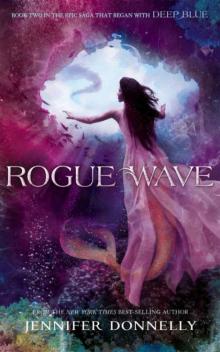 Rogue Wave
Rogue Wave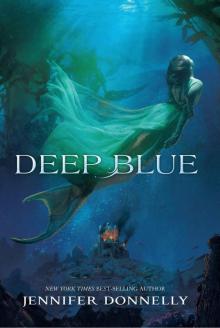 Waterfire Saga, Book One: Deep Blue (A Waterfire Saga Novel)
Waterfire Saga, Book One: Deep Blue (A Waterfire Saga Novel)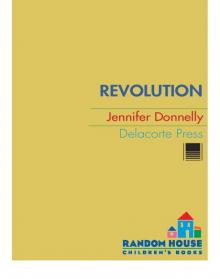 Revolution
Revolution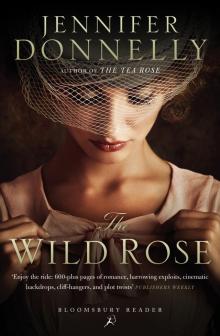 The Wild Rose
The Wild Rose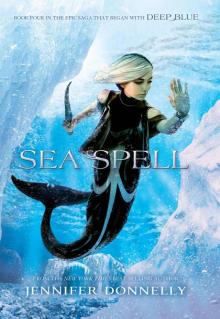 Waterfire Saga (4 Book Series)
Waterfire Saga (4 Book Series)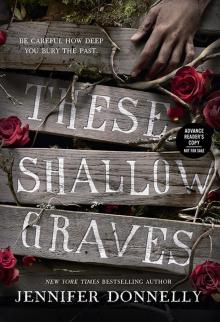 These Shallow Graves
These Shallow Graves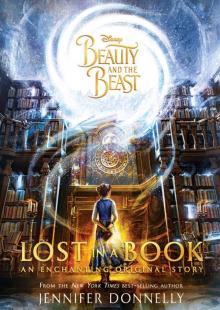 Beauty and the Beast: Lost in a Book
Beauty and the Beast: Lost in a Book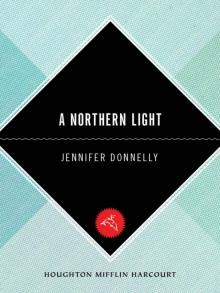 A Northern Light
A Northern Light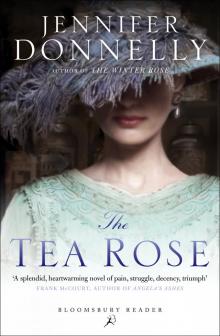 The Tea Rose
The Tea Rose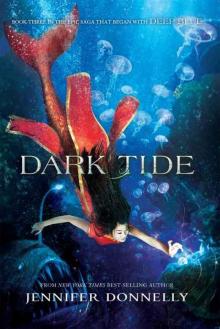 Waterfire Saga, Book Three: Dark Tide: A Deep Blue Novel
Waterfire Saga, Book Three: Dark Tide: A Deep Blue Novel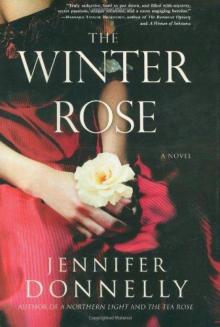 The Winter Rose
The Winter Rose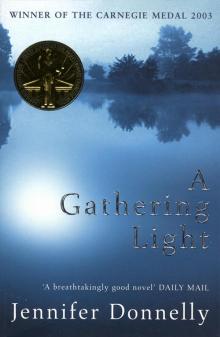 A Gathering Light
A Gathering Light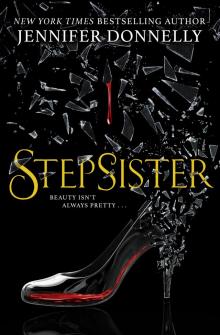 Stepsister
Stepsister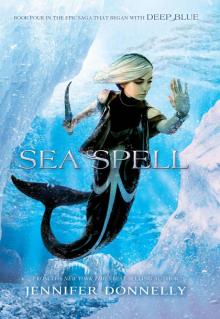 Waterfire Saga, Book Four: Sea Spell: Deep Blue Novel, A
Waterfire Saga, Book Four: Sea Spell: Deep Blue Novel, A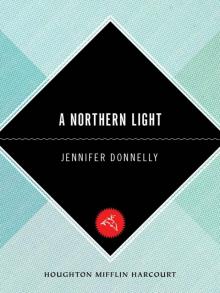 Northern Light
Northern Light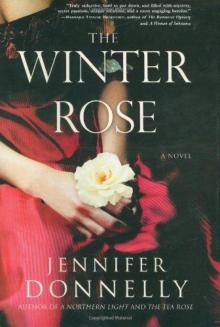 Winter Rose, The
Winter Rose, The